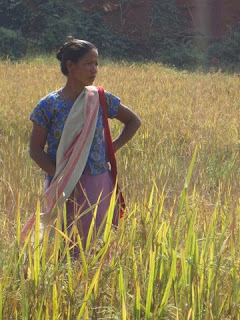Boonsong and Sombat from Partners demonstrated how decent charcoal can be made from modified 200-liter drum kilns using wood from low-grade trees, such as leucaena. In the process, wood vinegar is also manufactured, offering various farm applications such as insect and odor control. They also taught the group how charred rice husks are easily produced for use in soil mix and biochar. Additionally, a simple gasifier stove was demonstrated to show how cheap and readily available rice husks can be used as a clean-burning cooking fuel, being charred in the process.
Stefan Geiger from the Raintree Foundation taught the group how to install and use bio-sand water filters are installed and used. Mizuki Watanabe, with the Panya Project, shared about the production and use of wood vinegar in Japan.
Finally, the Partners team demonstrated how bladder-type biogas generators are easily and inexpensively made (using clear plastic sheets for instructional purposes). If well cared for, the biogas generators can operate for a few years.
The next ECHO Asia workshop will be held near Phnom Penh, Cambodia during February 21-23.






























